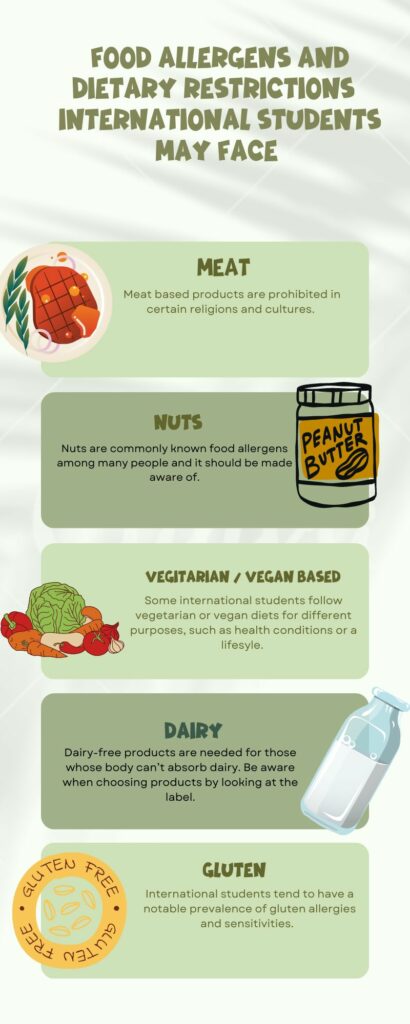International students challenge: Food allergens and Dietary restrictions.
International students may have food allergies to nuts, dairy, gluten, and eggs. Their different cultures and backgrounds may also affect their diet. Some communities do not eat meat, especially beef or chicken, while certain meats dictate the student’s dietary preferences. In addition, certain regions have diets that include more readily available food sources, which means that some international students are less likely to eat foods unavailable in their home country. So, students have to be careful and navigate menus to find suitable foods. Furthermore, some people may be allergic to dairy products like milk or cheese because they can’t absorb lactose. Therefore, our dish suggestion might help them choose dishes for their daily meals because it doesn’t use dairy products.
Food allergens and Dietary Restrictions
Dietary restrictions typically align with food allergies, and people’s diet restrictions are based on their feelings and personal beliefs. It include a vegetarian or vegan diet that is lactose-free, dairy-free, gluten-free, and coeliac. Most supermarkets now provide different food varieties to accommodate everyone’s preferred palette.

Vegetarian
Vegetarian or vegan diets are common among international students. They need plant-based options and accommodations for dietary preferences. In India, where vegetarianism is widespread, international students may encounter a food culture aligned with plant-based preferences. Awareness and accommodation for vegetarian diets are particularly crucial in this context.
Nuts
Nut allergies are common among international students, especially in countries like the United States. Awareness and accommodation for nut-free environments are crucial, requiring students to check labels and seek nut-free options.
Lactose/gluten/dairy-free
Lactose-free, dairy-free, and gluten-free are mainly based on health requirements. Several international students cannot ingest dairy products because their bodies cannot digest lactose, along with those who cannot digest gluten, so options that do not contain these substances, such as soy milk or almond milk, are now available. There are also many gluten-free options.
Meat Restrictions
Various regions have different meat restrictions based on cultural or religious beliefs. Some religions restrict the eating of beef, pork, and fish. However, other cultures believe eating specific meats, such as wild game, is taboo. This would ultimately mean international students would have to find stores that provide the required types of meat not cross-contaminated with the meat they are not allowed to eat.
This makes it easier for international students to find their preferred food choices, whether it’s because of religious, cultural, or personal beliefs.







